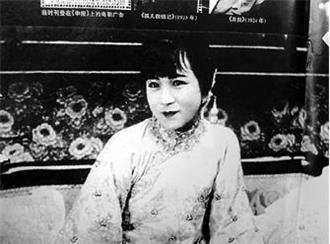(单词翻译:单击)
Wang Hanluri (1903 ?1978)
王汉伦(1903~1978)
Wang Hanlun, birth name Peng Qinshi, also called Jianqing, was bom in Suzhou, Jiangsu Province in 1903 and she herself was a film audience. She was one of China's first generation actresses, one of Four Great Dan (actresses) of early Chinese films and the first “Chinese tragic acress,".
王汉伦,原名彭琴士,字剑青,1903年出生于江苏苏州,自己喜欢经常去看电影,中国第一代著名女影星之一,中国电影早期的“四大名旦”之一, 也是首位“悲剧女星”。
Wang Hanlun went to an excellent private institution, St. Mary's School for Women in Shanghai when she was a young girl. Her father died when she was 16, she had to make a living, successively as a primary school teacher, a clerk in British and American tobacco companies and later as a full-time English language typist with rather high salary before becoming a actress.
少女时代曾就读于优秀私立学校——上海教会女校圣玛利亚书院。16岁她父亲去世,为了谋生 曾先后当过小学老师,在英美烟草公 司当过职员。从影前在一外企任专职 英文打字员,薪水颇丰。
Occasionally in 1923 she was introduced to act in Orphan Rescues Grandfather made by the Star Film Studio, starring Yu Weiru. Wang's thorough sensitive portrayal, sadness and anger and tenacity, of the besieged heroine moved audiences, made Orphan Rescues Grandfather China's first national hit and Wang Hanlun an overnight sensation. Orphan Rescues Grandfather became the first Chinese full-length feature film.
1923年,一个 偶然的机会经同事引荐参加明星影片 公司《孤儿救祖记》的拍摄,主演余蔚如。她把该角色的悲愤与坚韧表现得淋漓尽致,深深打动了观众。该影片轰动一时,使彭剑青一炮走红。《孤儿救祖记》成为中国第一部完整故事片。
Nearly a decade had passed since Yan Shanshan had appear on screen as the first actress, but only a handful of women had yet dared to. In those days, women's appearance on screen was still regarded as socially unacceptable behavior, especially for a young lady from upper-class. So there were enormous pressures on Peng from both family and society.Her acting on screen angered her elder brother and sister-in law and she had no other way than changing her making her birth name never known to the public. The family accepted this, and she adopted Wang Hanlun as her screen name. The surname derived from her belief that tigers are fearless and tigers have the Chinese character for king on their foreheads,so she changed her surname to Wang. She liked the English name Helen, so she adopted the similar Chinese name Hanlun.
自从严姗姗第一次出现在银幕上之后,近十年过去了,仅有个别女性敢于演电影。那时候,女性演电影仍然不被社会所接受,更不用说出身于上层社会家庭的小姐了。由于从影惹怒了兄嫂,彭剑青只好改名换姓,永远不让自己的原名出现在公众的视野。她的“王”姓来自她想到老虎是无所畏惧的,它 的额头上有个“王”字,于是就改姓王,她喜欢英文名字Helen,因此取了汉语谐音汉伦。

Starring in Divorcee (1924) and The Poor Children (1924) made Wang Hanlu the first Chinese outstanding tragic actress. Later in 1929, Wang founded her own independent film company, the Hanlun Film Studio, and produced An Actress's Revenge (Blind Love), in which she starred as the heroine. This film was a great success and had been shown abroad. But Wang then disbanded the company and with the profits from what turned out to be her last starring film, she opened the "Hanlun Beauty Parlo" in Shanghai, retired from films to become a businesswoman. She was very successful throughout the 1930s until the Japanese occupied Shanghai.
影片《弃妇》(1924)、《苦儿弱女》(1924)等的拍摄,使她成为令人瞩目的中国第一位悲剧明星王汉伦。后来,她于1929年曾开设过自己的电影公司“汉伦影片 公司”,拍摄了《盲目的爱情》(即《女伶复仇记》),由自己主演。该片拍得很成功, 曾远销国外。不过此时她却解散公司,退出影坛,利用她主演的最后一部电影的收人在上海开办了“汉伦美容院”,成为商人。20世纪30年代,在日本侵占上海前她还是很成功的商人。
Affer the foundation of new China, she became a member of Shanghai Film Actor Troupe, acted a supporting role of Empress Dowager in Wu Xun (1950). She had taken part in more than ten films, such as the artistic documentary film A Great Upsurge. On August 17, 1978, Wang Hanlun passed away in Shanghai.
新中国成立后,成为上海电影演员剧团的成员,在《武训传》(1950)中扮演过配角慈禧,曾参加《热浪奔腾》(1958)艺术纪录片的拍摄。一生共参加10余部影片的摄制。1978年8月17日,王汉伦病逝于上海,终年78岁。


